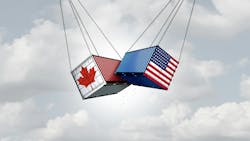Canada Rolls Back Most Retaliatory Tariffs on U.S. Goods
Canada's Prime Minister Mark Carney announced on August 22, 2025, that most retaliatory tariffs on U.S. goods will be removed, with the exception of autos, steel, and aluminum. The move is intended to ease the economic strain on Canadian businesses and consumers and aligns Canada's approach with U.S. tariff exemptions under the United States-Mexico-Canada Agreement (USMCA).
"Canada and the United States have reestablished free trade for the vast majority of our goods," Carney said on Friday. "Canada will retain our tariffs on steel, aluminum, and autos as we work intensively to resolve the issues there."
Canada first imposed retaliatory tariffs in March 2025 on a wide range of U.S. products, including oranges, alcohol, clothing, motorcycles, and cosmetics. These measures were largely a response to U.S. sector-specific tariffs, such as the 232 tariffs on steel and aluminum. While former Prime Minister Justin Trudeau initiated some of these tariffs, Carney's administration has now adjusted Canada's approach, using the USMCA framework to protect most trade while focusing on resolving remaining sector-specific disputes.
The decision came after a phone call between Carney and former U.S. President Donald Trump, followed by a Cabinet meeting. Carney emphasized that Canada's position under the USMCA remains strong. More than 85% of Canada-U.S. trade continues to be tariff-free, with the U.S. maintaining an average tariff of just 5.6% on Canadian goods. Carney described the rollback as a step to restart trade talks with Washington, noting that Canada is matching U.S. exemptions rather than simply giving in to demands.
Carney stated that the decision will go into effect on September 1, 2025.
What People Are Saying
"AED would like to thank Prime Minister Carney for listening to our industry and ensuring that retaliatory tariffs don't further damage the Canadian economy amid the ongoing trade disruption. AED encourages the U.S. government to accept Canada's gesture of goodwill and return to a free trading environment between the two countries." — Brian McGuire, president & CEO, AED.
AED has led a campaign highlighting the negative impact of retaliatory tariffs on Canadian dealers and customers, as well as their effect on Canada’s ability to build dynamic trade corridors and compete globally.
"Trump's attacks on auto, steel, aluminum, and forestry sectors are hurting Canadian workers in real time. Walking back counter-tariffs isn't an olive branch. It only enables more U.S. aggression." — Lana Payne, president of Unifor.
Unifor is Canada’s largest private sector union.
"Any small tariff on Canada, any amount, by the United States has an outsized effect because more than 20% of our economy is exports to the U.S." — Pierre Poilievre, Canadian Opposition Conservative leader.
About the Author
Laura Davis
Editor-in-Chief, New Equipment Digest
Laura Davis is the editor in chief of New Equipment Digest (NED), a brand part of the Manufacturing Group at EndeavorB2B. NED covers all products, equipment, solutions, and technology related to the broad scope of manufacturing, from mops and buckets to robots and automation. Laura has been a manufacturing product writer for eight years, knowledgeable about the ins and outs of the industry, along with what readers are looking for when wanting to learn about the latest products on the market.
